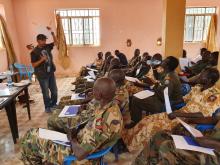Shree Adhikari, UN Volunteer Human Rights Officer with the United Nations Mission in South Sudan (UNMISS) tells his story of commitment to peace and human rights in his assignment.
I have a law and human rights back ground, and I strongly believe that bullets have never been a source of peace in any setting.
Where human rights are protected, peace will prevail, and civilians will feel safe and secure. Human rights, peace and civilian safety are therefore three pillars of a stable society, existing alongside one another. With over 15 years professional work experience in the field of human rights in post-conflict countries, I was excited to have been selected for an opportunity to serve as an International UN Volunteer, Human Rights Officer in South Sudan with the United Nations Mission in South Sudan (UNMISS).
My day-to-day work involves working with the South Sudan People Defense Force (SSPDF), South Sudan National Police Service (SSNPS) and National Security Services (NSS). As civilian peacekeeping staff, we are involved in the protection of civilians through dialogue and engagement, provision of physical protection and the establishment of protective environments. My role falls under the “dialogue and engagement” pillar of civilian protection through the UNMISS-Human Rights Division (HRD). Together with other colleagues from UNMISS, we are, not only, engaged in building capacity, skills, knowledge, and expertise of civilians in relation to peace but also empowering them to respect and protect the human rights of other people.
Volunteering in South Sudan has been both challenging and very exciting. Most weeks, I have to drive approximately 7 to 8 hours in muddy roads to reach remote communities to set up workshops with security agencies. We generally organize a 2 to 3 day workshop every month. During the workshops and training, I engage the security agencies in dialogue and discuss the challenges and best practices relating to the provisions of the South Sudanese Constitution and international trends regarding civilian rights and peace processes.
Working in these conditions requires impeccable logistical planning, utmost commitment, resilience and determination which I have steadily mastered. Due to limited resources, we work closely with churches and schools to utilize their infrastructure for most of our workshops. Despite the hardships, I resolve to work even harder for the people of South Sudan.
I thrive in knowing that I am part of a greater team at UNMISS that is involved in protecting civilians and securing peace in the world’s youngest country.
The ultimate responsibility for the protection of civilians lies with the government, and our work at UNMISS only complements the government’s efforts. I am always proud when I witness a change in the attitude of security personnel as they develop a greater appreciation of human rights due to my interventions and discussions with them. However, this is not always the case with all the workshop participants. My greatest achievements in my assignment is always when civilians live in harmony with each other and when national security personnel operate in line with rights guaranteed by the Constitution of South Sudan and other UN Human Rights treaties.

